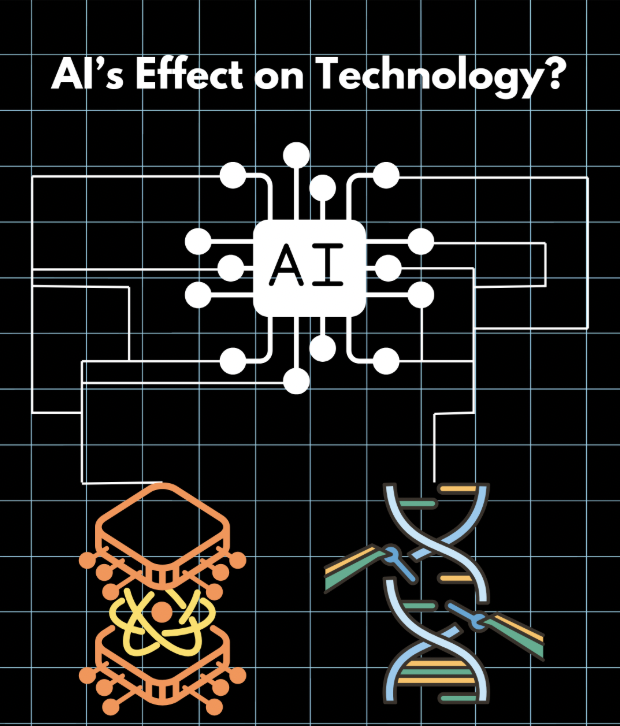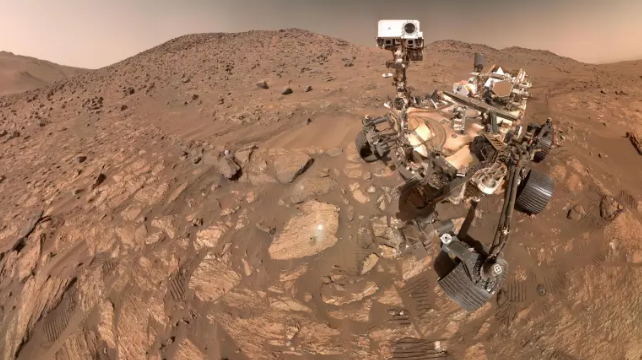Humanity constantly pushes for innovation. We have turned sand from our beaches into electronics that can work autonomously on a different planet. While our accomplishments are impressive, asking what innovation will come next is intriguing. The obvious answer is that AI will be our next innovation. While AI, as we know, is beneficial, answering any question we pose, the ways AI is used in research are infinitely more interesting. AI is the innovation that sparks innovations in every aspect of science. AI will rapidly increase development, specifically in quantum computing and genetic engineering, and will create the next breakthroughs for society.
How does AI work in the first place? AI currently works in these stages, as explained by the company Coursera. AI first takes in tons of data, usually hand-picked by humans, though some AIs can collect their data. Then, the AI processes all the data by making patterns between data points. These patterns are very complex in extensive AIs, but that is their specialty. Then, the AI tests these patterns in a test. For example, it would use its data to predict a trend and already know the answer. If it fails, it restarts its processing and edits its patterns accordingly. It goes through many more tests, and the outcome is made. As AI processes more data and learns about new patterns, it slowly gets smarter.
If it improves each time, what would be the next breakthrough? The problem with this model is it must be specified for a single task. This means AI thinking outside the box or complex problem solving will always be hindered as its processing focuses only on one task. Artificial general intelligence, or AGI, would solve this problem. AGI aims to mimic human capabilities and be knowledgeable about every topic. This will allow self-learning of subjects and understanding of new, unfamiliar subjects. AGI is still vastly underdeveloped, but with time, it will revolutionize humanity.
So, how are we going to use AI? What about a field that humans currently don’t understand completely?
Quantum computing is another field that shows promise. Quantum computing combines traditional computers with quantum mechanics, studying things smaller than an atom. Matter smaller than atoms has some weird qualities we can exploit in quantum computing. Traditional computers work in binary only, meaning they transmit information by being on or off. Conventional computers work like Morse code, sending different messages across its system.
On the other hand, Quantum computers can use more than just on and off to communicate information. Quantum computers remove the limitations of only two outputs in traditional computers, allowing computation of calculations or models that would otherwise take decades or centuries for our computers to do. Quantum computers will enable us to optimize thousands of processes. For example, quantum computers could find the optimum distribution channels for the widespread allocation of resources. They could even aid in machine learning and help create AGIs.
The problem is quantum computers are very unstable. Any type of interference can ruin the whole system. That is why quantum computers are chilled to the lowest temperatures possible to forbid any unwanted movement in the system. However, errors still emerge, which holds quantum computers from their potential. Luckily, AI in the future could fix these errors or make predictions about when they will occur and account for them. As quantum computers help create better AIs, this would be an improvement cycle, allowing both technologies to grow. Quantum computers are advancing quickly, and as AI grows alongside them, it will become a staple technology of humanity.
While mechanically quantum computers will change our society, genetic engineering may change all biology. CRISPR (Clustered Regularly Interspaced Short Palindromic Repeats allows cellular editing of DNA. It uses an enzyme–Cas9–to destroy a part of DNA or insert a segment of DNA editing, which is how the cells act. If perfected, this can permanently cure genetic diseases, neutralize diseases, create specific cell testing for research, and help research cancer. It can also edit humans to express qualities like being smarter or having desired physical traits. However, playing God is seen as unethical and will create huge disparities between people. CRISPR in the future will improve or extend millions of lives, and AI will rapidly strengthen its development.
CRISPR’s main drawback is that it is not as precise as scientists want. While it is the most accurate gene editing we have developed, CRISPR may still cause unintended consequences by affecting genes near the inflicted area. AI’s goal is to minimize or avoid these unintended consequences. It has already been shown that AI can predict off-target effects in human cells. AI will also help analyze genetic data and choose what part of the DNA needs to be edited. AI will help remove all the drawbacks of CRISPR, and the only thing holding us back is how far we want to go.
While AI already impacts humanity, when applied to science, the impact will be like nothing we have seen before. This isn’t a new concept. Scientists are already trying to implement AI in these fields. When AGIs are created, these fields will be flooded with scientific breakthroughs. AI will revolutionize quantum computing and genetic engineering in ways never seen before.






